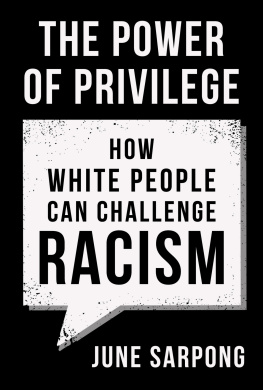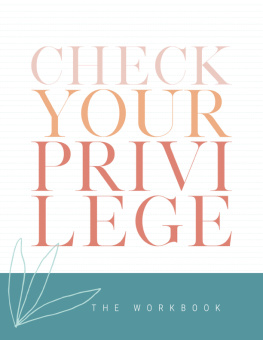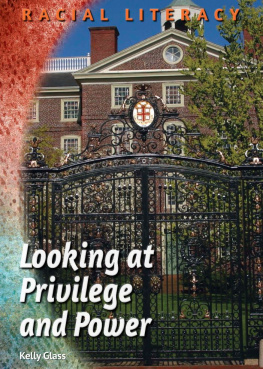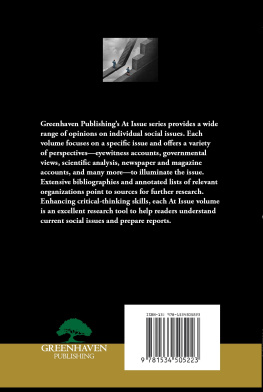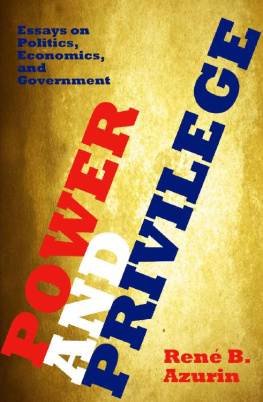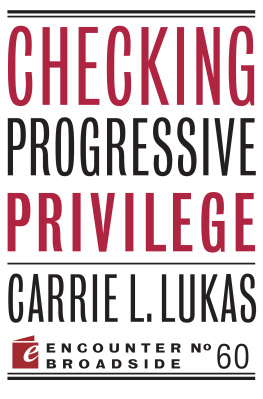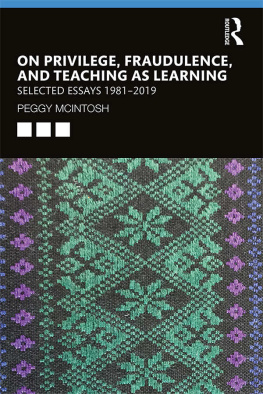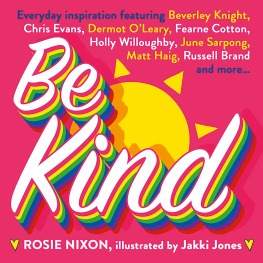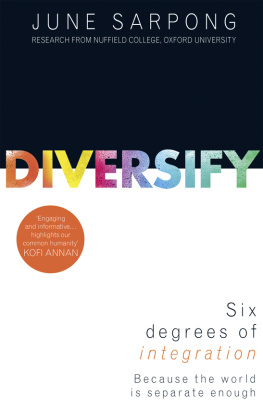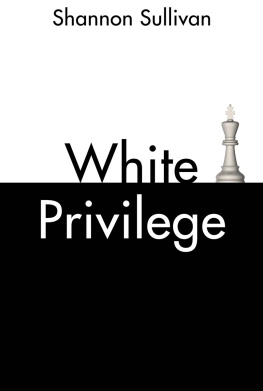June Sarpong - The Power of Privilege
Here you can read online June Sarpong - The Power of Privilege full text of the book (entire story) in english for free. Download pdf and epub, get meaning, cover and reviews about this ebook. year: 2020, publisher: HarperCollins Publishers, genre: Politics. Description of the work, (preface) as well as reviews are available. Best literature library LitArk.com created for fans of good reading and offers a wide selection of genres:
Romance novel
Science fiction
Adventure
Detective
Science
History
Home and family
Prose
Art
Politics
Computer
Non-fiction
Religion
Business
Children
Humor
Choose a favorite category and find really read worthwhile books. Enjoy immersion in the world of imagination, feel the emotions of the characters or learn something new for yourself, make an fascinating discovery.
- Book:The Power of Privilege
- Author:
- Publisher:HarperCollins Publishers
- Genre:
- Year:2020
- Rating:4 / 5
- Favourites:Add to favourites
- Your mark:
- 80
- 1
- 2
- 3
- 4
- 5
The Power of Privilege: summary, description and annotation
We offer to read an annotation, description, summary or preface (depends on what the author of the book "The Power of Privilege" wrote himself). If you haven't found the necessary information about the book — write in the comments, we will try to find it.
The Power of Privilege — read online for free the complete book (whole text) full work
Below is the text of the book, divided by pages. System saving the place of the last page read, allows you to conveniently read the book "The Power of Privilege" online for free, without having to search again every time where you left off. Put a bookmark, and you can go to the page where you finished reading at any time.
Font size:
Interval:
Bookmark:
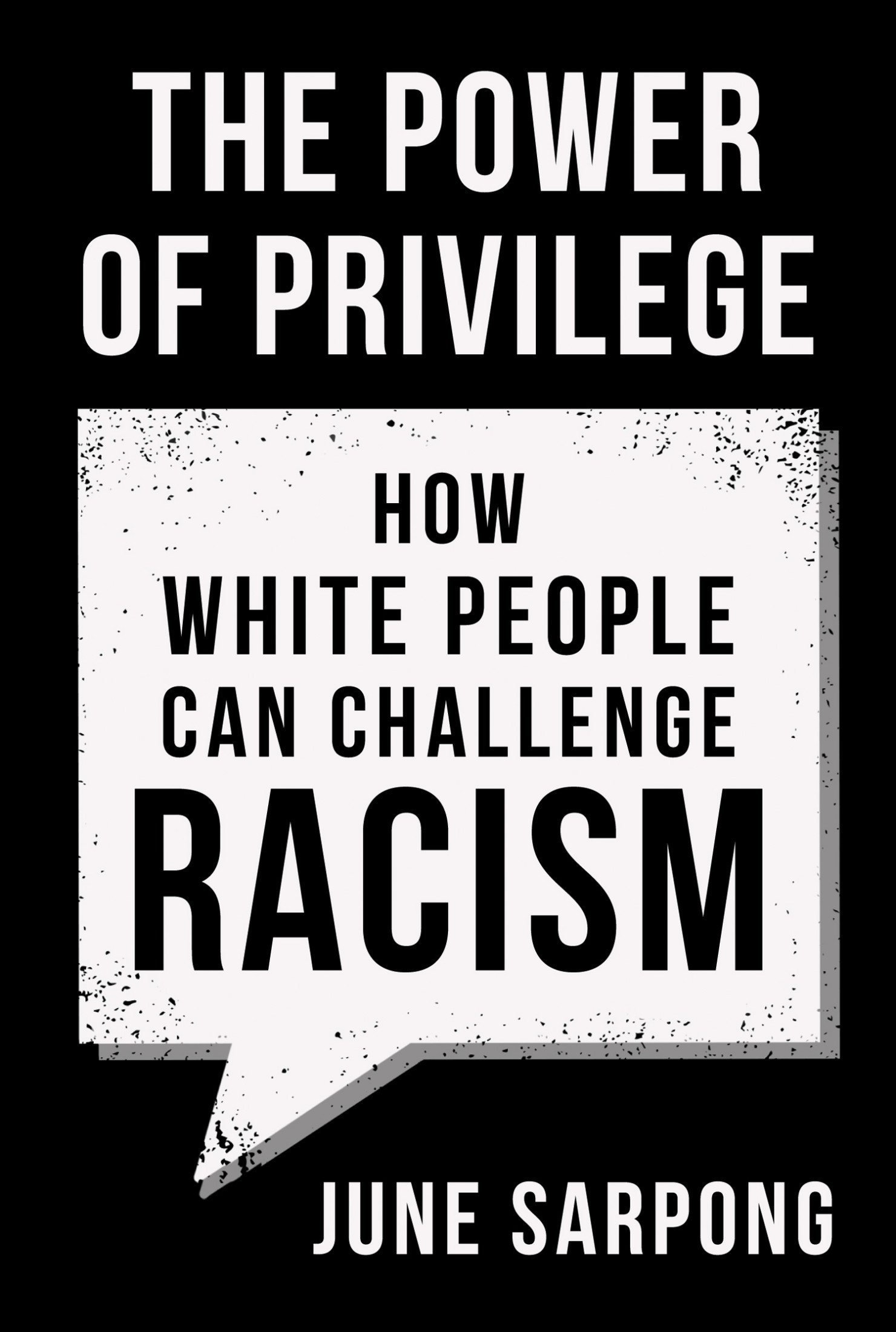
JUNE SARPONG OBE is one of the most recognizable British television presenters and broadcasters and a prominent activist, having co-founded the WIE Network (Women: Inspiration and Enterprise) and the Decide Act Now summit. In 2019, she was appointed the first ever Director of Creative Diversity at the BBC.
June is the author of Diversify, an empowering guide to why a more open society means a more successful one, and The Power of Women, which proves the importance of feminism in the personal, social, and economic progress of society as a whole.

An imprint of HarperCollins Publishers Ltd
1 London Bridge Street
London SE1 9GF
First published in Great Britain by HQ in 2020
Copyright June Sarpong 2020
June Sarpong asserts the moral right to be identified as the author of this work.
A catalogue record for this book is available from the British Library.
This novel is entirely a work of fiction. The names, characters and incidents portrayed in it are the work of the authors imagination. Any resemblance to actual persons, living or dead, events or localities is entirely coincidental.
All rights reserved under International and Pan-American Copyright Conventions. By payment of the required fees, you have been granted the non-exclusive, non-transferable right to access and read the text of this e-book on-screen. No part of this text may be reproduced, transmitted, downloaded, decompiled, reverse engineered, or stored in or introduced into any information storage and retrieval system, in any form or by any means, whether electronic or mechanical, now known or hereinafter invented, without the express written permission of HarperCollins.
Ebook Edition October 2020 ISBN: 9780008435936
To anyone who has the
desire and drive to do better.
Contents
Dear Reader,
Recent events around racial injustice have inspired many with agency and privilege in society to ask, what can I do? and how can I be an effective ally? We are way beyond the point of empty rhetoric our actions must embody our ideals. Equality must be designed by each and every one of us. The challenge may be great, but it is certainly not insurmountable, and we all have a part to play.
This book will help to identify the capacity that you, the reader, has to build the fair and just society that the better part of ourselves knows to be possible. Id like to personally thank you for embarking on this important journey of positive change with me. There will be some uncomfortable moments, but getting comfortable with being uncomfortable is a major first step in making a real difference.
June
The white mans happiness cannot be purchased by the black mans misery.
Frederick Douglass
Racism
Racism is the belief that people of some races are inferior to others, and the behaviour which is the result of this belief. Racism also refers to the aspects of a society which prevent people of some racial groups from having the same privileges and opportunities as people from other races.
Collins English Dictionary
Anti-racism
Anti-racism is an active and conscious effort to work against multidimensional aspects of racism.
Robert J. Patterson
Other (noun)
A person of a marginalized or excluded group or demographic within society.
Otherize or otherizing (verb)
To exclude or facilitate the exclusion of an individual or group through action or inaction.
Otherism (noun)
A conscious or unconscious bias that is formed through ignorance or conditioning that results in beliefs or actions that exclude individuals or groups deemed different or other.
Otherizing happens when our brains make incredibly quick judgments and assessments of people and situations, often without us realizing. Our prejudices are influenced by our background, culture and personal experiences. Without us actively exploring and challenging our limiting beliefs we can be inadvertently complicit in fuelling inequality.
Diversify.org
*
As a child growing up on a council estate in Londons East End, I can remember my Ghanaian immigrant parents drumming into me the idea that I was going to need to work twice as hard for half as much. I dont remember ever asking them, Work twice as hard for half as much as who? And they never explicitly stated who the who was. They didnt need to the signs were everywhere. From my young, impressionable eyes, I could see for myself that everything that represented power and privilege was white primarily white and male... and the opposite of me.
This is a conversation that every child of colour raised in the West will have had with their parents or caregivers. They might not recall when they first had the conversation, but they will remember having had it. For non-white children growing up as minorities in Europe or North America, the first uncomfortable conversation with parents isnt about the birds and the bees that comes later. Much more pressing matters come first: the harsh realities of the discrimination that is likely to impact them the moment they leave the safety of their parents home and enter the world. White children have the luxury of waiting until their tweens before having to learn about the realities of life. Sadly, children of colour are told much earlier, and their conversation is about the inequities they will invariably face at some point, no matter how talented or brilliant they might be.
I describe in the foreword of the British edition of Black Enough, Ibi Zobois book of short stories for teens, that this is a heartbreaking burden that parents of colour or white parents of non-white children have to bear. Children of mixed-race heritage are one of the fastest-growing ethnic groups in Britain, and this is a rapidly increasing trend in the USA too, so now many parents who might not themselves have a lived experience of discrimination are having to have the the conversation.
The conversation meant I didnt complain when my parents berated me for my less than A* report card, or for my tardiness, or corrected my grammar, spelling or mispronunciations even though they had heavy African accents themselves, they demanded their children speak the Queens English because the stakes were higher for me. I wasnt on a level playing field. No, it wasnt fair, but it was the reality, and I had to make the most of the hand Id been dealt. My parents journey to the UK had not been an easy one, so in comparison to all they had experienced, my dose of inequality did not seem worthy of complaint. There were no excuses no matter what, they still expected the best from me and my siblings. The only problem was that inequality meant second-generation immigrant kids like me might not actually be given the opportunity to be able to do our best.
My first book, Diversify, examined the social, moral and economic benefits of diversity and explained why inclusive societies are better for everyone. While promoting Diversify, I found myself travelling all over the world having conversations around the sorts of prickly subjects we are supposed to avoid in polite company, subjects such as gender, class, sexual orientation, race and religion. I mediated while those from both underrepresented and privileged groups engaged in difficult yet brutally honest and open dialogue. I listened while people bravely voiced their concerns, hurts, frustrations, confusion, shame and guilt. I was heartened and humbled by the sorts of breakthroughs I saw take place between, friends, families, colleagues and strangers. The kind of understanding I witnessed made me more hopeful than ever, even in such divisive times. However, even with these breakthroughs, wherever I went there was an ever-present elephant in the room, the role of the main beneficiaries of our unfair system: white people, particularly privileged white men.
Font size:
Interval:
Bookmark:
Similar books «The Power of Privilege»
Look at similar books to The Power of Privilege. We have selected literature similar in name and meaning in the hope of providing readers with more options to find new, interesting, not yet read works.
Discussion, reviews of the book The Power of Privilege and just readers' own opinions. Leave your comments, write what you think about the work, its meaning or the main characters. Specify what exactly you liked and what you didn't like, and why you think so.

